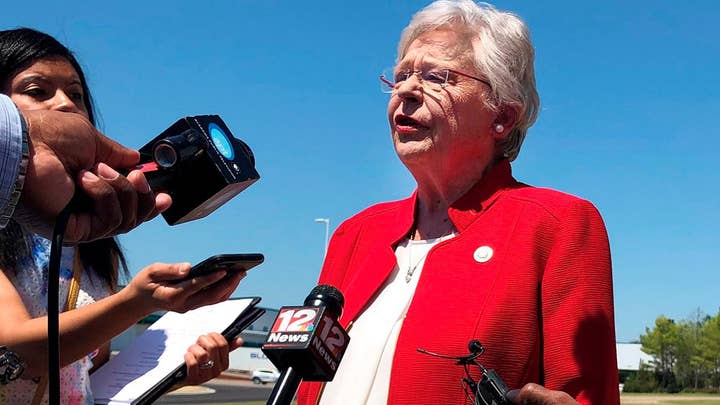Missouri Senate advances bill to ban abortions in the state
Ban would block women from receiving procedure at 8 weeks into pregnancy.
The Missouri House on Friday approved a restrictive abortion bill that would ban abortions after the eighth week of pregnancy -- one of a slew of similar bills in red states that have sparked a heated national debate on abortion rights.
The bill was passed by the Senate on Thursday, and now with approval from the House goes to Republican Gov. Mike Parson, who is expected to sign it.
GEORGIA GOV. BRIAN KEMP SIGNS CONTROVERSIAL 'HEARTBEAT' BILL INTO LAW
The legislation would make Missouri one of the most restrictive states in the country for abortions. The bill includes exceptions for medical emergencies, but not for rape and incest. It also bans abortions based solely on race, sex or a diagnosis of potential Down Syndrome.
While women who have an abortion would not be prosecuted under the legislation, doctors could face as much as 15 years in prison for performing an abortion at eight weeks and beyond. Democrats opposed to the bill attacked the legislation in blistering terms.
"Laundry, bleach, acid bitter, concoction, knitting needles, bicycle spokes, ballpoint pens, jumping from the top of the stairs or the roof," Democratic Rep. Sarah Unsicker said. "These are ways that women around the world who don't have access to legal abortions perform their own."
The bill’s passage in the House comes after Alabama Gov. Kay Ivey signed a law Wednesday that would outlaw almost all abortions, making performing one punishable by up to 99 years in prison unless the mother’s health is at risk. That law, too, did not grant exemptions in cases of rape or incest.
"This legislation stands as a powerful testament to Alabamians’ deeply held belief that every life is precious and that every life is a sacred gift from God," Ivey said in a statement.
In Georgia, Gov. Brian Kemp this month signed a “heartbeat” bill into law that prohibits abortions in the state after a heartbeat is detected, as early as six weeks into a pregnancy. That bill does allow exceptions in case of rape, incest and if the life of the mother is in danger.
ALABAMA GOVERNOR SIGNS RESTRICTIVE ABORTION BILL INTO LAW AS ACLU VOWS TO SUE
"Georgia is a state that values life," Kemp said before putting his signature to the LIFE Act. "We stand up for those who are unable to speak for themselves."
The bills mark the latest shots in a looming fight over the legacy of Roe v Wade. The Alabama bill was written in part to reignite the battle over the controversial 1973 Supreme Court decision that legalized abortion across the country. Ivey noted that the bill is unenforceable because of Roe v. Wade and won’t come into force unless it is overturned.
Kentucky, Mississippi and Ohio have also approved abortion bans once a heartbeat can be detected. Laws in North Dakota and Iowa have been struck down by the courts. Some conservatives hope that, with the Supreme Court having shifted to the right in light of the recent appointments of Justices Neil Gorsuch and Brett Kavanaugh, there is now a chance the court will revisit Roe and overturn it.
But GOP Rep. Nick Schroer said the Missouri bill is "made to withstand judicial challenges and not cause them."
"While others are zeroing in on ways to overturn Roe v. Wade and navigate the courts as quickly as possible, that is not our goal," Schroer said. "However, if and when that fight comes we will be fully ready. This legislation has one goal, and that goal is to save lives."
CLICK HERE FOR THE FOX NEWS APP
Planned Parenthood Action Fund President Leana Wen on Thursday accused Gov. Parson of riding the "disgraceful coattails of 25 white men in Alabama who just voted to ban safe, legal abortion.”
If the courts don’t allow Missouri’s legislation to take effect, it includes a series of less-restrictive time limits (14, 18 and 20 weeks) that may be more likely to win favor with the courts.
Fox News' Caleb Parke, Vandana Rambaran and The Associated Press contributed to this report.





